You might use your GOLFLINK handicap (if you have one) mostly for playing club competitions and betting, but what that number measures is your “regular game”.
And that’s good to know, but what if you want to find out what your game would look like if you were able to turn every dial up to the max? With the body, brain and talent you have, just how good could you get?
We set out to answer that question for you – quantitatively and qualitatively – with the help of experts in data analysis, swing instruction and sport psychology. Lucius Riccio is a sports-data researcher at Columbia University and one of the original members of the USGA committee that developed golf course Slope Ratings. James Sieckmann and Nick Clearwater are Golf Digest 50 Best Teachers with special skill sets. Sieckmann is the short-game coach to dozens of PGA Tour players and thousands of amateurs from his base in Nebraska, and Clearwater develops the teaching programs that hundreds of coaches use at GolfTEC locations worldwide. Rounding out the team, Bhrett McCabe is the mental-game coach for the University of Alabama athletic department and works with several PGA Tour players, including Billy Horschel, Graeme McDowell, Patton Kizzire and Brian Harman.
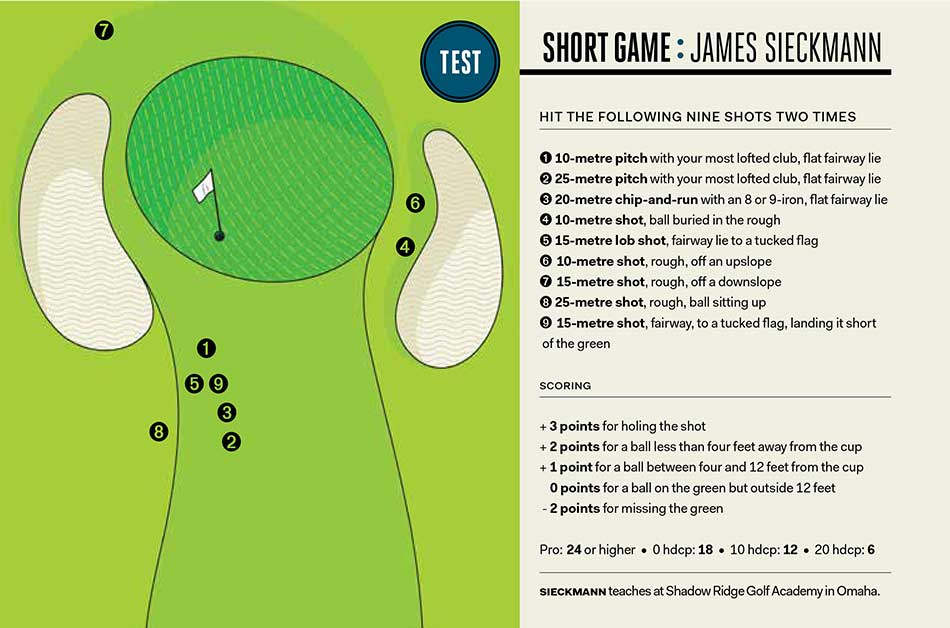

To truly predict an amateur player’s peak playing ability, we first asked Riccio to crunch big data – individual shot outcomes from thousands of golfers with Handicaps from plus-2 to 30. By figuring how likely a player at each scoring level is to produce what is considered an “acceptable” result, Riccio was able to determine how many shot attempts any player would need to have at least an 80-percent chance to hit a good one. That analysis led Riccio to develop a simple test that golfers of any skill level can take to determine how close they are to playing their best.
The way to reveal your potential, Riccio says, is to play a modified nine-hole ambrose. Depending on your current average score, you’ll hit up to four balls from each location tee to green. If your average score is 77 or lower, you get one extra ball from each spot. If you shoot 78 to 93, you can hit up to two extra balls. For those who average 94 or higher, it potentially becomes a four-ball ambrose.
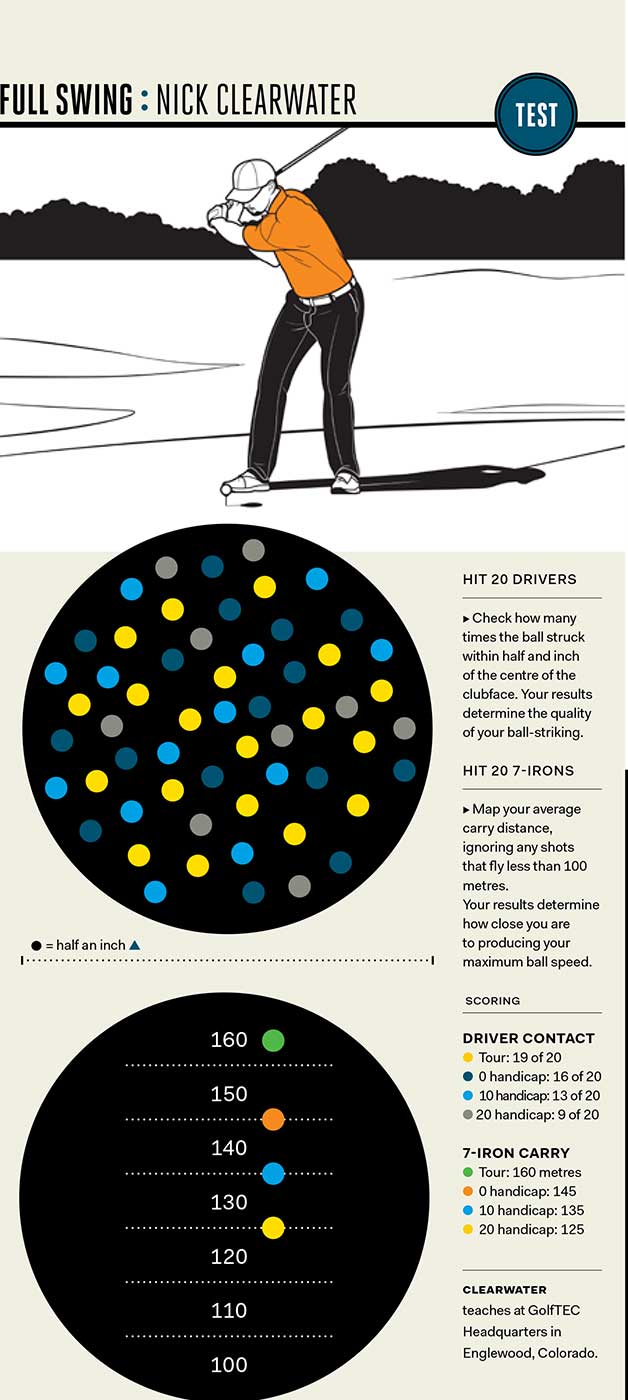
But where this differs from a normal ambrose is that you should move on after hitting any shot you would deem good in a typical round. For example, if you’d normally be satisfied to hit a shot anywhere on the green on a par 3, and you do that on your first try from the tee, don’t bother hitting again. Move on to the putt. (It’s probably best to do this on a quiet day at your course.)
Another difference from a normal ambrose is that you get only one extra chance on the green. In other words, you can take another try at improving your lag putt, or re-do a shorter putt you feel you should have made, but you don’t get multiple whacks from every location on the putting surface.
The final step to completing this test is to take your nine-hole score and double it. That number reflects the best you can expect to play with the physical skills and mental game you have now, Riccio says.
A bonus benefit of taking this test is it magnifies the tendencies – good and bad – of your typical game. For example, you might need to take all four of your ambrose tee shots on a majority of holes. That means your driving is probably holding you back. Or you can’t capitalise on the extra shots you get around the greens. Maybe more time around the practice green is needed. But if you’re still not sure, Sieckmann and Clearwater have designed programs to evaluate exactly where your skills in those areas stand, with practice plans that will translate into noticeable improvement the next time you try the modified ambrose.
Sieckmann’s short-game challenge allows you to compare your test score to those of players from beginners to tour level. If you don’t perform as well as you’d like, check out his two drills to improve your success rate.
If you think your full swing is too inconsistent, Clearwater’s two skills tests – one for your driver and one for your 7-iron – show you how to measure yourself against other golfers in terms of ball-striking. He also offers a practice plan to help you hit better shots.
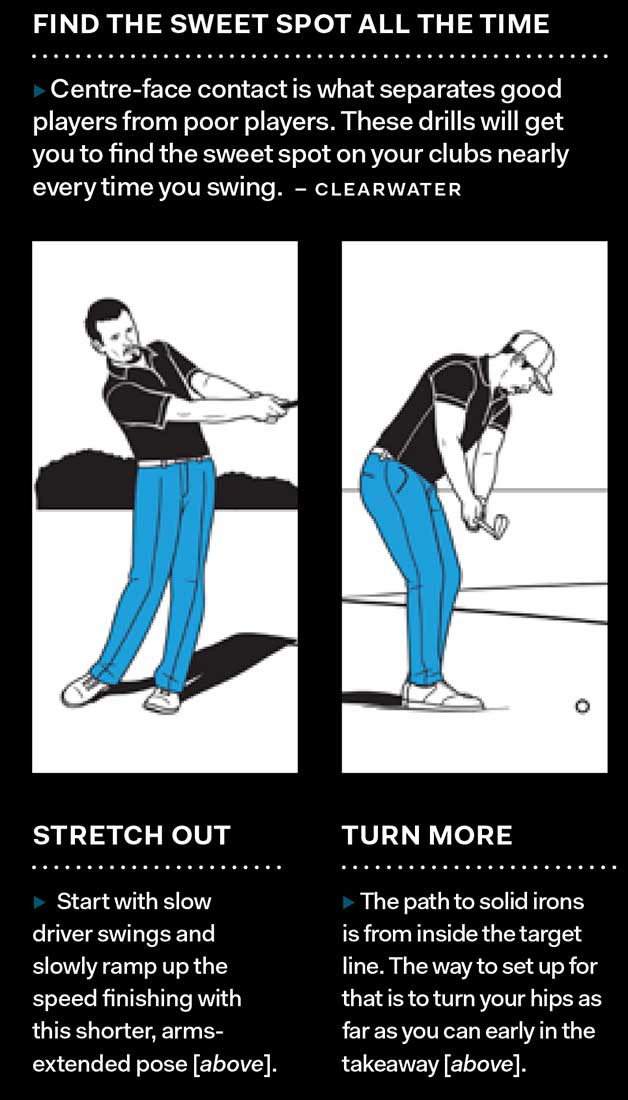 One of the fascinating elements of Riccio’s research is that it predicts the score players of various abilities should shoot in the modified ambrose. How you fare in comparison to Riccio’s prediction is another indicator of why you aren’t (or are) playing to your potential. If your ambrose score is significantly lower than Riccio’s predicted score, it means you have the physical goods to be a lot better at this game, but you likely need to improve your playing strategy and/or mental performance to access that ability more often.
One of the fascinating elements of Riccio’s research is that it predicts the score players of various abilities should shoot in the modified ambrose. How you fare in comparison to Riccio’s prediction is another indicator of why you aren’t (or are) playing to your potential. If your ambrose score is significantly lower than Riccio’s predicted score, it means you have the physical goods to be a lot better at this game, but you likely need to improve your playing strategy and/or mental performance to access that ability more often.
According to McCabe, it’s a skill any player can learn. “It starts with understanding that your best is not your standard,” McCabe says. “When your expectations get out of control, you tend to quit when it gets hard. You make a double or triple-bogey early in the round and throw in the towel because you know you aren’t going to shoot a ‘good’ score.”
Instead, McCabe says defuse the performance pressure that comes with those expectations by resetting your focus on shooting your average score, treating each shot as separate and distinct with no lingering feelings about them, good or bad. “Try to do just your thing, not create an outlier score,” he says. “Accept that there are variances. That’s what gives you the freedom to shoot some of your lowest scores – not putting pressure on yourself to do it on the first tee.”
An example of that thought process? One of McCabe’s clients was struggling through a poor driving day, but after the round, he was practical and matter-of-fact about what happened.
“He said the range was the place to work those issues out,” McCabe says. “In the moment, on the course, it was time to play golf with whatever he had. He embraced the challenge of being the best version of himself he could be that day.”
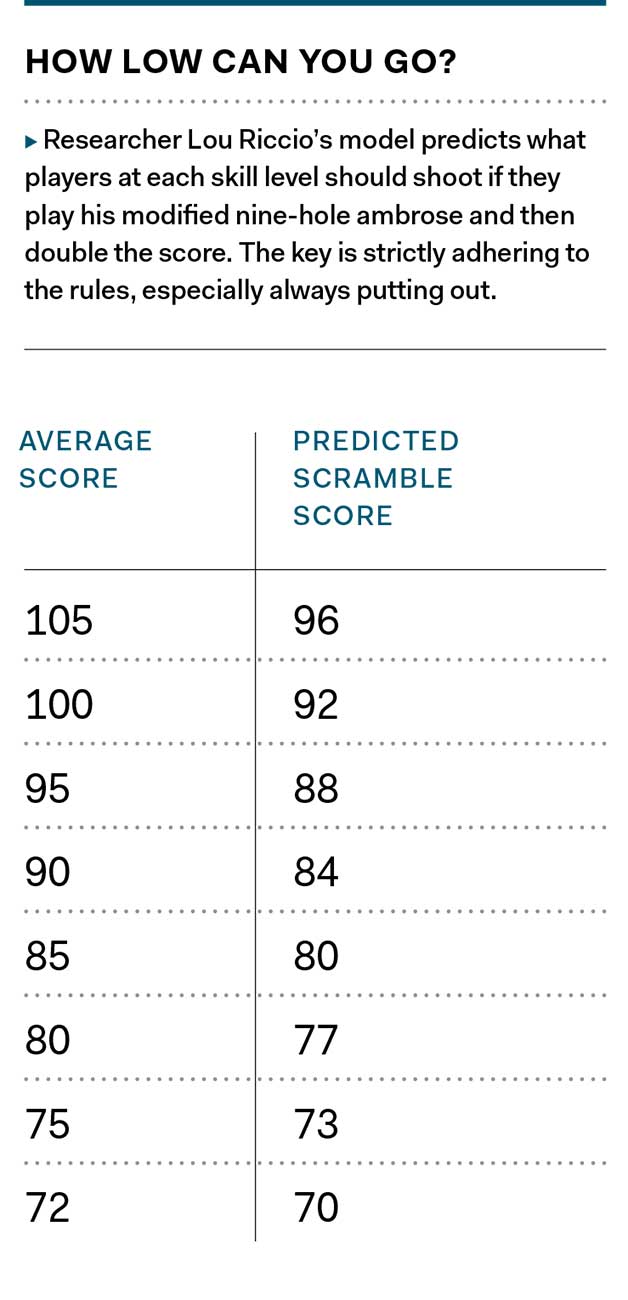
Still not sure how good can you be?
Take this quiz
Insurance actuaries prove with sobering accuracy just how little information they need to predict how long a person will live. Can we do the same for how good a person will get at golf? Potential is a funny thing to gauge in this game, where great amateur players come in all shapes and sizes. There are so many intangibles, but let’s just say we think the golfer who stands to improve the most has a good attitude and a lifestyle conducive to playing loads of golf. Tally the value of your answers to see how many strokes we think you can improve. If it’s depressing, hey, we hope you’re the exception who proves us wrong.
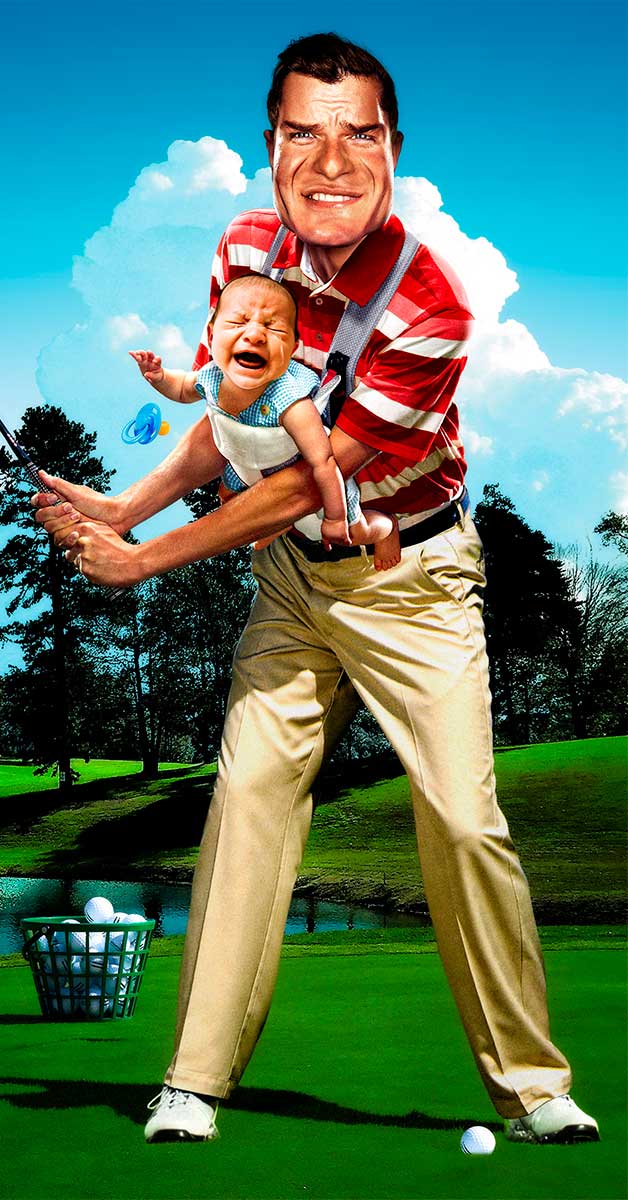 i shot my best ever round…
i shot my best ever round…
+3 Within the past six months
+1 Within the past six years
0 Within the past six decades
a telling feature of my local climate is…
0 Some golf carts have heaters
+1 Some golf carts have misters
+2 Carts? You could walk all day in this weather
+3 Our club pro is also a scuba-diving instructor
when i’m playing well…
0 I’m waiting for something bad to happen
+1 I just ride the wave
+2 It’s one shot at a time
–1 I need to focus extra hard
the largest impediment to my sleep health is…
+3 My bedroom blinds let in just that creep of light
+2 Bingeing Netflix
0 Pre-dawn alarm clocks for work and golf
–2 Multiple infants/children crying in the night
the most convenient driving range for me is…
0 Four suburbs away
–1 Off mats with crappy balls
+2 Part of a facility that also has a great short-game area
+4 Right on the way home from work
when i play, i’ll often…
–1 Respond to work e-mails
–2 Skip a shot or two to answer a call
–4 Skip a hole or two to run a call
+4 Remember how life was before I invested in Google
my mind-set about practice is…
+2 I like to have a drill to work on
+3 I split equal time between swing and short game
–1 Boring! I can go for a half hour, tops
–2 After two minutes, it’s all drivers
other than golf, my weekend is probably going to include…
–1 A trip to Bunnings
–2 A kid’s soccer game
–3 Multiple kids’ soccer games
+4 A romantic encounter followed by a lazy brunch and getting to know each other
when i hit a bad shot…
+1 I want to go make up for it
–2 Stay the hell away from me
0 I think I should be home mowing the lawn
+2 I just think, Hey, bad shots happen
when i wake up, my back feels like…
+3 A well-oiled machine
0 I could use a new mattress
–1 It had a saddle on it yesterday
–4 I’d better check my health insurance policy
Key
–15 to 0 Sorry, but your best golf is behind you until a major life event happens.
1-15 You’re primed to shave two to three strokes off your game.
16-30 There’s really no excuse for not cutting your handicap in half during the next 12 months.



